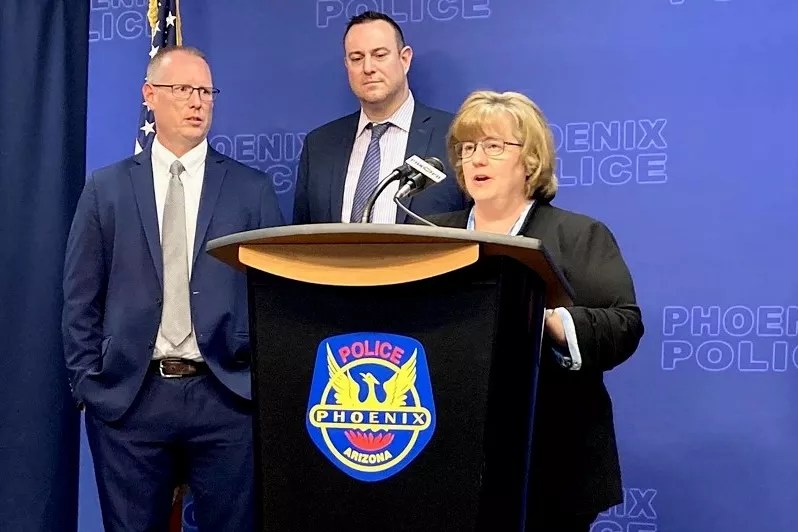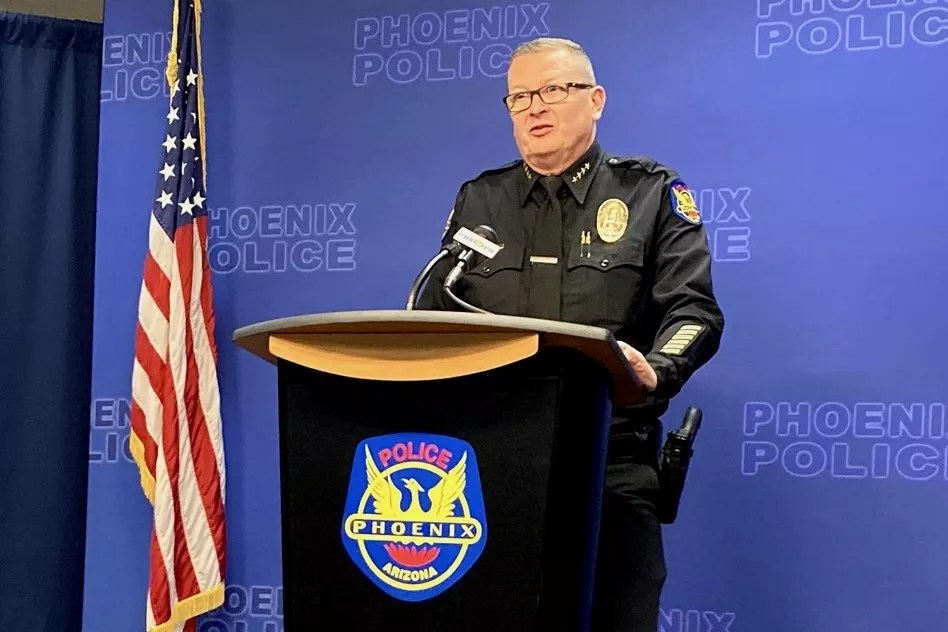
Stephen Lemons

Audio By Carbonatix
The myth of an epidemic of organized retail theft – depicted in viral videos of brazen shoplifters, indifferent security guards and smash-and-grab retail gangs – has largely been debunked by researchers. Yet it remains irresistible to Maricopa County Attorney Rachel Mitchell.
One of Mitchell’s recurring themes as she runs for reelection is that organized retail theft is on the rise, forcing businesses to raise prices or even close their doors altogether.
During an April 18 press conference at Phoenix Police Department headquarters, Mitchell, flanked by police Chief Michael Sullivan, announced indictments against three women arrested for organized retail theft – stealing products from stores for resale – as a priority of her administration. Phoenix police gave the six-month investigation that led to the arrests a catchy, made-for-TV-news name: “Operation Makeup Break Up.”
“This is a massive problem in the community, and we’re determined to put an end to it,” Mitchell said.
She also doubled down on the organized retail crime panic and called on Gov. Katie Hobbs to sign Senate Bill 1414, claiming she needed a new law to go after repeat offenders of organized retail theft.
According to state law, organized retail theft is a class 4 felony, with a presumptive sentence of 2.5 years. An Arizona Senate fact sheet on SB 1414 said the bill could bump that presumptive sentence up to 4.5 years.
But Mitchell did not charge the three women with organized retail theft, opting instead to hit the trio with more serious felonies, belying the supposed need for a new law.
Mitchell said the women – Guadalupe Gamez-Moreno, 35, Alejandra Reyes-Torres, 48, and Reyes-Torres’ daughter, Jennifer Zazueta-Reyes, 22 – ran a criminal enterprise that bought and resold high-end beauty supplies stolen from area stores by shoplifters.
“This was an elaborate scheme that these women engineered in order to stock their makeshift stores inside their homes,” Mitchell said.
Mitchell explained that the Phoenix police probe resulted in the trio’s arrest and the seizure of 12 pallets of stolen property from stores such as Ulta Beauty, Sephora and Bath & Body Works. She said the stolen merchandise was valued at more than $500,000.
Mitchell said Reyes-Torres of Tonopah was indicted on one count of illegal control of an enterprise, a class 3 felony, and four counts of trafficking in stolen property, class 2 felonies. Gamez-Moreno of Phoenix was indicted on one count of illegal control of an enterprise and one count of trafficking in stolen property. Zazueta-Reyes, also of Phoenix, was indicted on one count of illegal control of an enterprise.
Class 2 and class 3 felonies are serious charges, with presumptive sentences for first-time offenders of 5 and 3.5 years, respectively. Still, Mitchell maintains that she needs punishment bumped up for organized retail theft, which SB 1414 would do.
It all sounds like a much-needed crackdown on big-time retail thieves.
There is just one problem: The numbers and analysis don’t bear Mitchell out. Researchers and critics of law enforcement claim that organized retail theft is not on the rise in most cities and that concern about the nonviolent crime is overblown. Some go so far as to call it a moral panic, whipped up by police and prosecutors.

Jennifer Zazueta-Reyes, 22, Guadalupe Gamez-Moreno, 35, and Alejandra Reyes-Torres, 48, were arrested after a six-month investigation into retail theft by Phoenix police and the Maricopa County Attorney’s Office.
Maricopa County Attorney’s Office
The making of an urban myth
In April 2023, the National Retail Federation, a trade group representing retailers, issued a report claiming that nearly one-half of all inventory losses was caused by organized retail crime, equaling $45 billion in lost revenue.
The claim was later debunked, and the federation issued a retraction. The New York Times called the idea that America was in the middle of a retail theft crime wave “an exaggeration,” reporting that shoplifting incidents in most major cities have fallen since 2019.
“The various sources of crime data – from government agencies and private groups – tell a consistent story,” according to the Times. “Retail theft has not spiked nationwide in the past several years. If anything, it appears less common in most of the country than it was before the pandemic.”
While no one disputes that organized retail theft occurs and is a headache for businesses, Caroline Isaacs, executive director of the prison abolitionist group Just Communities Arizona, said Mitchell is dead wrong that it’s a “massive problem.”
“Criminalizing things doesn’t fix them,” she said. “Never has, never will. But when all you have is a hammer, everything looks like a nail.”
At the press conference, both Mitchell and Sullivan contended that the cost of organized retail theft trickles down to the consumer. Isaacs said that’s hooey.
“I’m telling you that cosmetics are ridiculously overpriced,” she said. “That’s what trickles down to the consumer. It’s business owners overcharging for crap.”

Phoenix police Chief Michael Sullivan joined Maricopa County Attorney Rachel Mitchell on April 18 to announce three arrests in a retail theft investigation.
Stephen Lemons
Phoenix shows decline in theft since 2019
While it’s hard to unsee gangs of thieves in hoodies smashing jewelry counters and hauling out sacks of goodies from luxury retail stores, the actual retail theft figures require context.
A report in March from the nonprofit Brennan Center for Justice said that despite spikes in high-profile cities such as Los Angeles and New York, FBI crime data does not show an increase in retail theft nationwide. The report noted that the most complete FBI data available does not distinguish between retail theft and other kinds of theft, placing them under the general category of larceny.
The report stated that larceny has been on the decline nationally since 1990, with a 10% decrease since 2019. It also cited a study from the nonpartisan Council on Criminal Justice that discounted the idea of a national surge in retail theft.
The council studied shoplifting incidents from 24 U.S. cities from January 2019 to June 2023. Seven cities showed increases in shoplifting, with New York and Los Angeles seeing the largest spikes. All of the other cities, including San Francisco, showed a decline.
Data from Phoenix was not part of the study. But the Phoenix police department’s own statistics show a general decline in overall larceny, with 39,427 incidents in 2019 and 26,195 incidents in 2023, a decrease of nearly 34%.
Phoenix uses the Uniform Crime Reporting Program’s definition of larceny as “the unlawful taking, carrying, leading, or riding away of property from the possession or constructive possession of another.” Examples include bicycle thefts, thefts of car parts, shoplifting, pickpocketing or “the stealing of any property or article that is not taken by force, violence or fraud.”
Statistics from the Arizona Department of Public Safety also reveal a statewide decline of 31% in larceny incidents from 2019 to 2023. DPS statistics show a decline of larceny incidents in Maricopa County of 28% during the same time frame.
According to a DPS spokesperson, incidents of organized retail theft would be included in the larceny category. DPS does, however, have numbers for shoplifting incidents as a subset of larceny. The number of shoplifting incidents for the state from 2019 to 2023 decreased by 29%. Maricopa County showed a similar decrease of 28%.
Such statistics seem to fly in the face of law enforcement’s attempts to portray organized retail theft as a growing threat. A 2020 study from the National Trade Federation showed that organized retail crime costs businesses an average of $719,548 per $1 billion in sales, which would be .07%.
But during the April 18 press event, Mitchell said her office is handling more organized retail theft cases.
“From January 1st of this year, we have had 271 cases submitted to our office on organized retail theft, which represents a total of 857 charges submitted, and there’s eight months to go in this year,” she said.
Mitchell conceded that one reason why there’s been an increase in cases has to do with how prosecutors are handling the crime. She said her office lowered the dollar threshold for which a case is referred to prosecutors on her organized retail theft task force. The threshold went from $25,000 in stolen goods to $5,000.
Isaacs isn’t buying it. She said Mitchell’s press conference, “looks like it was brought to you by the retail association of wherever.” She also said that the last thing Arizona needs is another criminal law like SB 1414.
“The only solution these people have to offer us is, we’ll make it illegal, and we’ll put somebody in prison, and somehow that’s magically going to stop harm happening to people,” Isaacs said, speaking of prosecutors such as Mitchell. “It’s the most expensive fallacy in human history.”
On Tuesday, Hobbs vetoed SB 1414. On April 16, she signed into law SB 1411, which creates an Organized Retail Theft Task Force in the office of Arizona Attorney General Kris Mayes. The panel’s first report is due on July 1, 2025.
“I look forward to reviewing their policy recommendations and working together to find balanced policies for this matter,” Hobbs said in her veto letter.